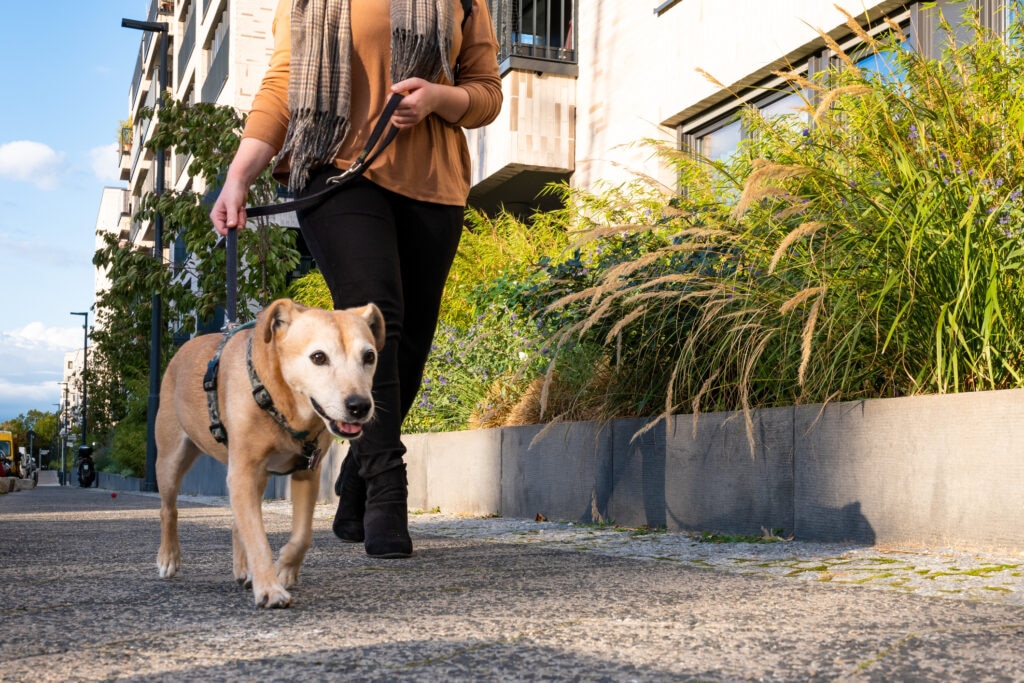6 Reasons You Should Adopt a Senior Dog

Photo by fotografixx/E+
It’s hard to walk past a puppy at the shelter and not scoop them up immediately (because, well, those faces), but they’re not the only ones deserving of forever homes.
Senior dogs are just as adorable and lovable as puppies—and a lot less likely to shred your favorite shoes while you’re at work.
Key Takeaways
- Senior dogs are often overlooked in shelters but make loving, grateful companions.
- Many come with training and medical histories, making them easier to integrate into your life.
- Older pups often have lower energy needs and require less supervision than puppies.
- Adopting a senior dog can bring unique health and happiness benefits to your life.
The Benefits of Adopting a Senior Dog
1. They Are Often Overlooked in Shelters
While 60% of puppies and younger dogs get adopted, only 25% of senior dogs find new homes. And often, their presence in shelters has nothing to do with behavioral issues.
According to Heather Allen, president and CEO of HALO Animal Rescue in Phoenix, Arizona, “Older dogs tend to be surrendered more for human issues versus issues with the dogs themselves. Meaning, the owner becomes ill, moves into nursing care, or passes away.”
These dogs were once cherished companions—and could be again—but are often passed over due to their age.
“Senior dogs seem to show gratitude to their adopters, which can look like a quiet, soulful appreciation for being given a second chance,” says Kristen Brauer, DVM, a veterinarian at Healing Hands for Pets in St. Petersburg, Florida. “After settling in, they’re typically affectionate, intuitive, and content simply being near their people.”
2. You May Know More About Them
While many shelter pups come with mystery backgrounds, senior dogs often arrive with their life stories intact, including medical records, training information, and favorite activities.
“It’s tremendously helpful for us to receive the pet’s history,” says Allen. “This helps us understand their needs and what type of home would make the best match.”
This kind of insight means you won’t have to guess whether your new pup is house-trained, gets along with cats, or has any medical needs.
But Dr. Brauer says age doesn’t necessarily equate to illness. “The biggest misconception is that adopting a senior dog means immediately taking on massive medical expenses or imminent end-of-life planning,” she says. “While it’s true that some seniors have age-related issues, many are in excellent health and have had regular or updated wellness care by the rescue group.”
Plus, even if you adopt a puppy, it doesn’t guarantee a clean bill of health. “Younger dogs can come with just as many, or even more, unpredictable health challenges,” says Dr. Brauer. “Older dogs often provide a clearer picture of their health needs from the start, allowing the adopter to plan rather than be surprised.”
3. They Tend To Require Less Training
Not interested in house-training a puppy or teaching cues? A senior dog might be your perfect match. Many older dogs already know how to potty like pros and won’t turn your table into a chew toy.
“Some of the biggest benefits to adopting an older dog is their knowledge of how to interact with humans better than a puppy,” says Allen. “Most older dogs know how to walk on a leash, how to ride in a car, and understand potty training and basic [cues].”
Of course, every dog is different, and being a senior doesn’t guarantee flawless behavior. Some may still need a refresher course or help adjusting to new routines. But in general, they require less supervision than puppies and tend to be lower maintenance.
4. Senior Pups Have Lower Energy Needs
Not everyone can keep up with a puppy who thinks 6 a.m. is a good time for a game of fetch. Senior dogs offer a more relaxed pace that can be ideal for many households.
But this doesn’t mean your senior dog will be a permanent couch potato (though some do love their nap time). “Many are still plenty active and ready for adventures, whether it’s a stroll around the block or a car ride to a new place,” says Dr. Brauer.
Keep in mind that activity levels should match the senior dog’s needs. “Long walks and even runs can be appropriate for a healthy, active senior dog, while gentle walks may be more appropriate for a dog that has some arthritis or is slower,” says Dr. Brauer.
She adds that keeping senior dogs engaged doesn’t require marathon training sessions: “Soft play [with a plush toy], puzzle toys, and simply being included in daily activities all make a big difference.”
Recommended Products
5. Age Is but a State of Mind
Think old dogs can’t learn new tricks? Think again. “All dogs learn throughout their life if you teach them new things,” says Allen. “Most dogs are very food motivated and want to enjoy time with their people, so their biggest limiting factor is their owner’s knowledge of training and their desire to teach.”
Dr. Brauer emphasizes that mental enrichment is just as important as physical exercise for seniors. “Scent games, treat-dispensing toys, and low-impact training can help keep their minds sharp and spirits bright,” she says.
Recommended Product
6. The Impact on Your Health and Happiness Is Unmatched
There’s a deep emotional reward in knowing you’ve given a senior dog comfort and love in their golden years,” says Dr. Brauer. “It’s a bond built on mutual respect and quiet gratitude.”
But adopting a senior dog won’t just give you the warm fuzzies—it might be good for your health, says Dr. Brauer. “Studies show that spending time with dogs reduces stress, lowers blood pressure, and improves overall well-being, and senior dogs in particular bring a special kind of calm into the home,” she says.
Adopting a Senior Dog Near You
Ready to open your heart and home to a senior pup?
Allen recommends starting your search online for adoptable dogs, as it’s generally the easiest approach. “There are many websites, such as Petfinder and Adopt a Pet, that have thousands of pets listed at any given time, and the filters can be used to find pets of a certain breed, size, age, and within a certain geographic area,” she says.
While these sites partner with shelters to feature dogs in your area, local shelters and rescue organizations are also great spots for finding senior dogs in need of homes.
Many have dedicated senior dog adoption programs, and staff members can help match you with a pup whose personality and needs align perfectly with your lifestyle.






